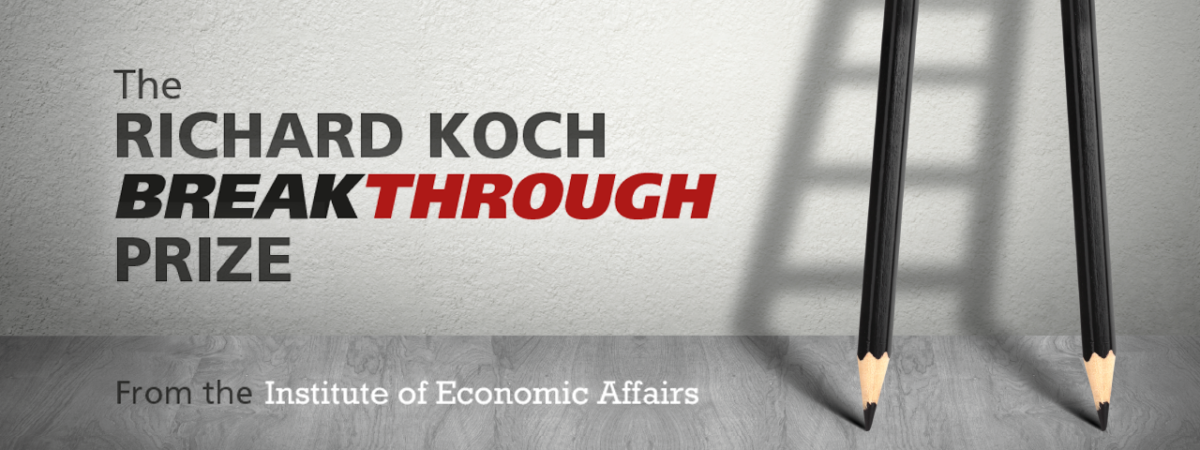£50,000 IEA Breakthrough Prize awarded to entry calling for public land to be freed up for housing
SUGGESTED

IEA releases the 2018 Breakthrough Prize finalists shortlist

2018 Autumn Budget briefing

IEA announces winner of the Richard Koch Breakthrough Prize
The prize, supported by entrepreneur Richard Koch, sought to find the best and boldest entry outlining a ‘free market breakthrough’ policy to solve the UK housing crisis. It was judged by a panel including Jacob Rees-Mogg MP, Richard Koch and Mark Littlewood, Director General at the Institute of Economic Affairs.
The winning entry proposes the ‘Land Purchase Act’ – a market-based policy that centres on how swathes of public land can be made available for people to build homes according to their own choice and preference.
The essay argues that the shortage of affordable housing in the UK has been caused by strict and outdated planning laws. Government interventions to address the issues – such as Help to Buy – have, on the whole, exacerbated the problem.
The submission makes the case for releasing surplus or underused public land to help people onto the housing ladder. Such a move could deliver as many as two million new homes, the majority of which would be built in areas where there is high demand for housing.
How the Land Purchase Act would work
• The government would enter into a contract with the occupier, who will take out a mortgage to cover the cost of building the property on the land.
• The occupier would decide on the style of house to be built. Furthermore, they would be given choice over the timescale and structure in which they gradually acquire private ownership of the land. This would include options such as paying rent for the land, purchasing the land at set intervals over time, or buying the land at a discounted rate after living on it for a set period of time.
• The Land Purchase Act would also reduce the number of planning restrictions on houses built on land made available under the policy.
• To ensure the scheme is not captured by short-termist developers, certain safe-guards would be put in place. Age, employment status and whether the occupier is a recipient of government assistance related to housing could be included in the criteria.
Benefits of the policy
• It offers people a ‘hand-up’ rather than a ‘hand-out’ and puts them on a path to homeownership, rather than government dependency.
• The policy would help to expand major cities and the surrounding areas, therefore boosting productivity.
• Lowering the cost of housebuilding by removing certain restrictions would make it easier for the new occupier to be approved for mortgages, insuring their financial security.
• This policy would also free up the incomes of new occupiers, improving their welfare but also increasing consumption and boosting the wider economy.
• Targeting those who currently receive government assistance with housing would alleviate the pressure on the existing social housing stock.
Commenting on the winning submission, Jacob Rees-Mogg, MP for North East Somerset and member of the Breakthrough Prize judging panel, said:
“A free market solution to the housing shortage would reinvigorate our home owning democracy. It is the most important political challenge once Brexit is concluded.”
Richard Koch, supporter of the prize and member of judging panel, said:
“I was struck by the quality of entries and range of good ideas, which can be enormously effective but also popular.
“The winning entry can open the possibility of a massive transfer of wealth from the state to individuals, perhaps comparable to the sale of council houses and privatisation in the 1980s.”
Notes to editors:
1. MEDIA ENQUIRIES
To arrange an interview with the winner, or for any other media enquiries, please call Nerissa Chesterfield, Head of Communications, on 07791 390 268.
2. ANNOUNCEMENT OF WINNER
The announcement of the prize will be at an event in central London tonight, 6.30pm – 10.00pm. For more details, contact Nerissa Chesterfield as above.
3. ABOUT THE WINNER
Ben works as an analyst for an intelligence firm in London and is responsible for helping clients understand the business, political and security risks to their operations across the Asia-Pacific region. He graduated from the University of Manchester in 2016 after reading for a degree in Chinese and Japanese.
Ben was also a finalist of the IEA’s pioneering Brexit Prize competition in 2014 and the Richard Koch Breakthrough Prize in 2017.
4. WINNING ENTRY
To download the winning entry, Land Purchase Act, please click here.
5. RUNNERS-UP
All three runners up will receive the Highly Commended Prize of £2,500 each. Other short-listed applicants will receive an entry prize of £500.
Stephen Ashmead’s entry calls for a framework of permitted new builds as an extension to permitted development rights, which would allow self-builders to fast-track their planning applications. The presumption would be that people can build their own homes unless they are demonstrably inappropriate for their community. This framework would be incorporated into local plans, allowing homes to be built to vernacular styles and blend into the local environment.
To download Stephen Ashmead’s entry, Presumed Permission: A self-build framework for local development rights, please click here.
The joint-entry from Charles Shaw and Daniel Pycock argues that the UK’s land-use policies and fiscal incentives distort the housing market, while the planning system adversely affects housebuilding and homeownership. The pair propose a system of Simplified Planning Zones which would eliminate the need for land-use planning permission, and exclude Section 106 and other complications from planning permission for development.
To download Charles and Daniel’s entry, please click here.
6. STUDENT PRIZE WINNER
Thomas Schaffner is the third recipient of our Highly Commended Prize, as well as the winner of this year’s Student Prize.
His entry notes that there is little public appetite for reforming Green Belt legislation, thus comprehensive liberalisation of the land market is not politically viable at present. Schaffer proposes a system of “Transferable Development Rights”, which would effectively compensate those affected by development on Green Belt land and could be used by local authorities to incentivise the construction of affordable accommodation.
To download Thomas Schaffner’s entry, Planning to the People: How a system of “Transferable Development Rights” could replace the “Green Belt”, please click here.
In addition to the Highly Commended Prize, Thomas will receive the Student Prize of £2,500.
7. SCHOOL PRIZE WINNERS
Luke McWatters and William Watts’s joint-entry argues that inflated land prices, due to years of artificial restrictions on supply, are at the core of the UK’s housing woes. Their proposed Land and Liberty Act will remove the designation of Green Belt completely, freeing up land for development in areas of high value and high demand around major urban centres, while maintaining picturesque areas by extending Areas of Outstanding Natural Beauty.
To download Luke McWatters and William Watt’s entry, Taking on Established Interests: A new approach to land to solve the housing shortage, please click here.
Luke and William will receive the School Prize of £1,500
8. ABOUT THE RICHARD KOCH BREAKTHROUGH PRIZE
This year’s Breakthrough Prize gives serious consideration to solving the housing crisis in the UK. Competitors were asked to propose a single policy initiative which would:
– Increase the number of houses built so as to markedly reduce the housing shortage in this country (this can be reduced through increased rental or ownership).
– Increasing the number and proportion of property owners in the UK
– Be politically possible
Submissions were requested of between 2,000 and 3,000 words.
For more detailed information about the remit and entry criteria please visit: www.breakthroughprize.org.uk
Richard Koch – who is supporting the Prize – is a British author, speaker, investor, and a former management consultant and entrepreneur. He has written over twenty books on business and ideas, including The 80/20 Principle, which is about how to apply the Pareto principle in management and life.
8. ABOUT THE IEA
The mission of the Institute of Economic Affairs is to improve understanding of the fundamental institutions of a free society by analysing and expounding the role of markets in solving economic and social problems.
The IEA is a registered educational charity and independent of all political parties.



